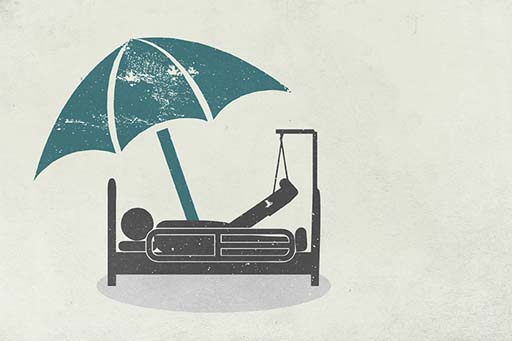8.3.1 Health insurance
Private medical insurance (PMI)
PMI is expensive, and questions have been raised about the lack of facilities in some private hospitals, such as the absence of accident and emergency facilities. Some people have political or moral objections to paying for private health care in a society with an NHS system. In 2009 the British Medical Association expressed concern that some PMI providers were preventing or restricting patient choice about the consultant or hospital that can treat them (BMA, 2012).
A decision about whether or not to supplement the care on offer in the UK from the NHS with private medical insurance (PMI) will depend on individual factors. For example, someone running a business that may lose trade while they wait for an operation may have a greater need for PMI than someone who is not in that position.
Other factors to consider may include your perception of local NHS waiting lists and facilities, or ancillary aspects of care such as being looked after in a private room, or being able to exercise more choice over where and when treatment takes place.
PMI usually covers hospital charges, treatments, drugs, diagnostic tests, outpatient treatments, and may pay cash for hospital stays when the insured opts for the NHS rather than private health care. Conversely, there are many substantial exclusions, such as all long-term and degenerative illnesses common in old age, AIDS, pregnancy, having vaccinations, and alcohol and drug misuse. PMI premiums have risen substantially in recent years for the same reason that term life cover premiums have been falling – advances in medical technology, procedures and available drug treatments. As a result, PMI can be very expensive in later life.
Partly in response to the rising costs, providers increasingly offer budget plans and pared-down policies with a larger excess that can limit the cost, as well as innovations such as links with gym memberships and so on.
NHS dental provision still exists on a patchy basis. While most people will have to pay 80% of treatment costs on the NHS, there are still some categories of people who are entitled to free treatment, such as children, people in receipt of certain benefits, pregnant women and people on a low income (including students), who can obtain an HC2 certificate by completing a form available from the dentist or local social security office. Being a pensioner does not guarantee access to free dental care. There are specific dental insurance policies available, as well as dental health plans. The latter require a monthly subscription in return for access to dental work – usually for no additional charge, or the subscription perhaps covers 75% of the costs incurred for certain ‘routine and restorative’ work. An individual’s monthly subscription will vary according to the condition of their teeth, although some schemes may be available through an employer on a group basis.
Health cash plans
These are different to PMI in that they offer small, direct cash payments in the event of certain medical circumstances, in return for a monthly payment that is effectively a subscription to belong to the plan (rather than an insurance premium). They also tend to focus on an individual’s (or family’s) primary health care needs, whereas PMI will focus more on specialist diagnostics and private hospital treatment. Health cash plans are traditionally offered by not-for-profit, mutual organisations like Health Shield and the Simplyhealth Group, which incorporates many previous plan providers like HSA and HealthSure. These plans enable policy holders to claim cash if they undergo common medical treatments such as dental and optical care, physiotherapy and sometimes complementary medicine, which PMI often does not cover.
Health plan providers generally offer a number of types of plan, ranging in cost and in the potential level of cash to be paid back to customers. Such plans are often available through employers who may operate a scheme whereby they obtain a discount for their employees. People take out these plans because they are seen as affordable and very simple. The number of health cash plans held in the UK is just over three million, with the vast majority of these being paid for by individuals rather than employers (Laing and Buisson, 2010). Another interesting development is that some providers of PMI (such as BUPA) who have been facing a declining market have entered the health cash plan market. This might in future serve to blur the distinction between the two types of financial product.

